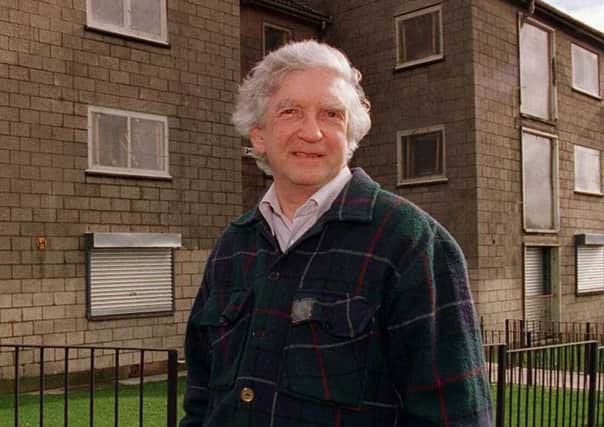Obituary: Bob Holman


In 1976 Bob Holman turned his back on a promising academic career at Bath University to create a community action project in a poor and rundown area of the city. He turned his home into a community centre and provided support for his neighbours. In 1987 he moved to Glasgow where he co-founded the community action project in Easterhouse – a huge housing development. Holman proved an inspiring and committed campaigner: he and his family lived in the area and fought for social justice and better conditions for the poor.
He was known locally as “The good man of Glasgow”. Rosemary Dickson the current chief executive of Fare told The Scotsman yesterday, “Bob’s contribution to changing the lives of people living in Easterhouse cannot be overstated. From the individuals struggling with financial issues to the long-term unemployed with mental health or alcohol issues and the children who lived in chaotic households.
Advertisement
Hide AdAdvertisement
Hide Ad“Bob helped them all. His Christian faith and belief in a fairer society underpinned everything he did – no-one was considered more or less important than another.”
Robert Holman (born Robert Bones) was born into a working class family in Ilford and later adopted the maiden name of his grandmother. Holman was evacuated to safer areas during the war and after school did his national service in the RAF. He read history and economics at University College, London and then gained a certificate in social administration at the London School of Economics.
From 1961 to 1966 he was a child care officer in Hertfordshire and then became a lecturer in social work in Birmingham where he witnessed the social impact of a society living in abject poverty. When he was working at Bath University he decided the world of academe was not for him and he sought to provide more practical help to the disadvantaged.
In 1989 Holman helped to establish the Easterhouse project in Glasgow providing support and advice for families and young people. His care, concern and desire to improve the area left an indelible mark on a sadly run-down area. Holman brought people together and gave hope to the young unemployed.
He certainly became part of the Easterhouse community: Holman lived in a council house and was known as “The Eastender”. He made a breakthrough when he started a youth group and organised ping-pong tournaments: he himself was fiercely competitive.
Holman lobbied politicians – both local and national – to improve the lot of the residents. In 2002, while he was leader of the Conservative Party, Iain Duncan Smith visited Easterhouse and they had an intense conversation. It was an unlikely pairing: Holman a lifelong and committed socialist and IDS a true-blue Tory. But the two worked well together and in 2007 he joined the MP’s Centre for Social Justice serving on its asylum seekers sub-committee. When IDS, as Secretary of State for Pensions, reduced welfare expenditure their friendship disintegrated.
Holman wrote optimistically of those early years and reported that IDS had said to him about Easterhouse: “I saw the poverty among a swath of forgotten people. I felt I had to do something and came away a changed man.”
He truly inspired many to work and live with a Christian basis to their work. He organised breakfasts for children on their way to school, visits to schools to talk about gang warfare and drugs. After three years Strathclyde police reported a halving of violence and vandalism. One of his joys was the annual trip for the young of Easterhouse to Lincolnshire for a week under canvas. Cuts discontinued this long-standing holiday. Holman characteristically described the axing as, “the Elastoplast level.”
Advertisement
Hide AdAdvertisement
Hide AdHolman retired in 2004 and moved to be closer to his grandsons. He continued to write, speak and lecture as a visiting professor at both Glasgow and Cardiff universities. He often returned to Easterhouse and remained one of its most enthusiastic champions: “I am” he said recently, “a product of Easterhouse.”
He was an avid reader and wrote prolifically both books and articles in the Guardian. Holman wrote several biographies: on his hero Keir Hardie, the Christian socialist George Lansbury, the pacifist clergyman Woodbine Willie, and the poet Geoffrey Studdert Kennedy. One critic wrote, “His books are quite breath-taking in their simplicity but also in their power.”
Rosemary Dickson concluded her memories of Holman, “He firmly believed that the solution to the problems that local people faced lay in harnessing their skills, talents and energy.
It was his Christian faith that drove him and maintained him after he was diagnosed suffering from Motor Neurone Disease in 2010. He continued to worship at Easterhouse Baptist Church: “Christianity” he said “is more than politics. It will be with me to the end.”
Holman is survived by his Glasgow-born wife Annette and their son and daughter.
ALASDAIR STEVEN